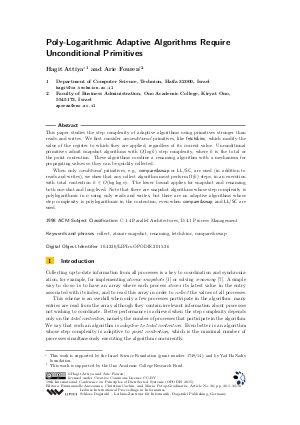Poly-Logarithmic Adaptive Algorithms Require Unconditional Primitives
Authors Hagit Attiya, Arie Fouren
-
Part of:
Volume:
19th International Conference on Principles of Distributed Systems (OPODIS 2015)
Part of: Series: Leibniz International Proceedings in Informatics (LIPIcs)
Part of: Conference: International Conference on Principles of Distributed Systems (OPODIS) - License:
 Creative Commons Attribution 3.0 Unported license
Creative Commons Attribution 3.0 Unported license
- Publication Date: 2016-10-13
File

PDF
LIPIcs.OPODIS.2015.36.pdf
- Filesize: 0.53 MB
- 16 pages
Document Identifiers
Subject Classification
Keywords
- collect
- atomic snapshot
- renaming
- fetch&inc
- compare&swap
Metrics
- Access Statistics
-
Total Accesses (updated on a weekly basis)
0Document
0Metadata
Abstract
This paper studies the step complexity of adaptive algorithms using primitives stronger than reads and writes. We first consider unconditional primitives, like fetch&inc, which modify the value of the register to which they are applied, regardless of its current value. Unconditional primitives admit snapshot algorithms with O(log(k)) step complexity, where k is the total or the point contention. These algorithms combine a renaming algorithm with a mechanism for propagating values so they can be quickly collected. When only conditional primitives, e.g., compare&swap or LL/SC, are used (in addition to reads and writes), we show that any collect algorithm must perform Omega(k) steps, in an execution with total contention k in O(log(log(n))). The lower bound applies for snapshot and renaming, both one-shot and long-lived. Note that there are snapshot algorithms whose step complexity is polylogarithmic in n using only reads and writes, but there are no adaptive algorithms whose step complexity is polylogarithmic in the contention, even when compare&swap and LL/SC are used.
Cite As Get BibTex
Hagit Attiya and Arie Fouren. Poly-Logarithmic Adaptive Algorithms Require Unconditional Primitives. In 19th International Conference on Principles of Distributed Systems (OPODIS 2015). Leibniz International Proceedings in Informatics (LIPIcs), Volume 46, pp. 36:1-36:16, Schloss Dagstuhl – Leibniz-Zentrum für Informatik (2016)
https://doi.org/10.4230/LIPIcs.OPODIS.2015.36
BibTex
@InProceedings{attiya_et_al:LIPIcs.OPODIS.2015.36,
author = {Attiya, Hagit and Fouren, Arie},
title = {{Poly-Logarithmic Adaptive Algorithms Require Unconditional Primitives}},
booktitle = {19th International Conference on Principles of Distributed Systems (OPODIS 2015)},
pages = {36:1--36:16},
series = {Leibniz International Proceedings in Informatics (LIPIcs)},
ISBN = {978-3-939897-98-9},
ISSN = {1868-8969},
year = {2016},
volume = {46},
editor = {Anceaume, Emmanuelle and Cachin, Christian and Potop-Butucaru, Maria},
publisher = {Schloss Dagstuhl -- Leibniz-Zentrum f{\"u}r Informatik},
address = {Dagstuhl, Germany},
URL = {https://drops.dagstuhl.de/entities/document/10.4230/LIPIcs.OPODIS.2015.36},
URN = {urn:nbn:de:0030-drops-66793},
doi = {10.4230/LIPIcs.OPODIS.2015.36},
annote = {Keywords: collect, atomic snapshot, renaming, fetch\&inc, compare\&swap}
}
Author Details
References
-
Yehuda Afek, Hagit Attiya, Danny Dolev, Eli Gafni, Michael Merritt, and Nir Shavit. Atomic snapshots of shared memory. Journal of the ACM, 40(4):873-890, September 1993.

-
Yehuda Afek and Yaron De Levie. Efficient adaptive collect algorithms. Distributed Computing, 20(3):221-238, 2007.

-
Yehuda Afek, Gideon Stupp, and Dan Touitou. Long-lived adaptive collect with applications. In Foundations of Computer Science, 1999. 40th Annual Symposium on, pages 262-272. IEEE, 1999.

-
Yehuda Afek, Gideon Stupp, and Dan Touitou. Long-lived and adaptive atomic snapshot and immediate snapshot. In Proceedings of the nineteenth annual ACM symposium on Principles of distributed computing, pages 71-80. ACM, 2000.

- Dan Alistarh, James Aspnes, Keren Censor-Hillel, Seth Gilbert, and Rachid Guerraoui. Tight bounds for asynchronous renaming. J. ACM, 61(3):18:1-18:51, June 2014. URL: http://dx.doi.org/10.1145/2597630.
-
James Aspnes, Hagit Attiya, and Keren Censoe-Hillel. Polylogarithmic concurrent data structures from monotone circuits. Journal of ACM, 59:2:2-2:24, 2012.

-
Hagit Attiya, Amotz Bar-Noy, Danny Dolev, David Peleg, and Rüdiger Reischuk. Renaming in an asynchronous environment. Journal of the ACM, 37(3):524-548, 1990.

-
Hagit Attiya and Vita Bortnikov. Adaptive and efficient mutual exclusion. Distributed Computing, 15(3):177-189, 2002.

-
Hagit Attiya and Arie Fouren. Polynomial and adaptive long-lived (2k-1)-renaming. In Distributed Computing, pages 149-163. Springer, 2000.

- Hagit Attiya and Arie Fouren. Adaptive and efficient algorithms for lattice agreement and renaming. SIAM J. Comput., 31(2):642-664, February 2002. URL: http://dx.doi.org/10.1137/S0097539700366000.
- Hagit Attiya and Arie Fouren. Algorithms adapting to point contention. J. ACM, 50(4):444-468, July 2003. URL: http://dx.doi.org/10.1145/792538.792541.
-
Hagit Attiya, Arie Fouren, and Eli Gafni. An adaptive collect algorithm with applications. Distributed Computing, 15(2):87-96, 2002.

-
Hagit Attiya, Danny Hendler, and Philipp Woelfel. Tight RMR lower bounds for mutual exclusion and other problems. In Proceedings of the fortieth annual ACM symposium on Theory of computing, pages 217-226. ACM, 2008.

-
Elizabeth Borowsky and Eli Gafni. Generalized flp impossibility result for t-resilient asynchronous computations. In Proceedings of the Twenty-fifth Annual ACM Symposium on Theory of Computing, STOC'93, pages 91-100, 1993.

-
Faith Fich, Danny Hendler, and Nir Shavit. On the inherent weakness of conditional synchronization primitives. In Proceedings of the Twenty-third Annual ACM Symposium on Principles of Distributed Computing, PODC'04, pages 80-87, 2004.

-
Arie Fouren. Adaptive Wait-Free Algorithms for Asynchronous Shared-Memory Systems. PhD thesis, Technion, 2001.

-
Maurice Herlihy, Victor Luchangco, and Mark Moir. Space-and time-adaptive nonblocking algorithms. Electronic Notes in Theoretical Computer Science, 78:260-280, 2003.

-
Maurice P. Herlihy and Jeannette M. Wing. Linearizability: A correctness condition for concurrent objects. ACM Transactions on Programming Languages and Systems, 12(3):463-492, July 1990.

-
Prasad Jayanti and Srdjan Petrovic. Efficient and practical constructions of LL/SC variables. In Proceedings of the twenty-second annual symposium on Principles of distributed computing, pages 285-294. ACM, 2003.

-
Prasad Jayanty. f-arrays: Implementaion and applications. In Proceedings of the 21th Annual Symposium on Princeples of Distributed Computing (PODC), pages 270-279, New York, 2002. ACM.

-
Yong-Jik Kim and James H Anderson. A time complexity lower bound for adaptive mutual exclusion. Distributed Computing, 24(6):271-297, 2012.

-
Mark Moir and James H. Anderson. Wait-free algorithms for fast, long-lived renaming. Science of Computer Programming, 25:1-39, 1995.

-
P. Turan. On an extremal problem in graph theory (in Hungarian). Mat. Fiz. Lapok, 48:436-452, 1941.

